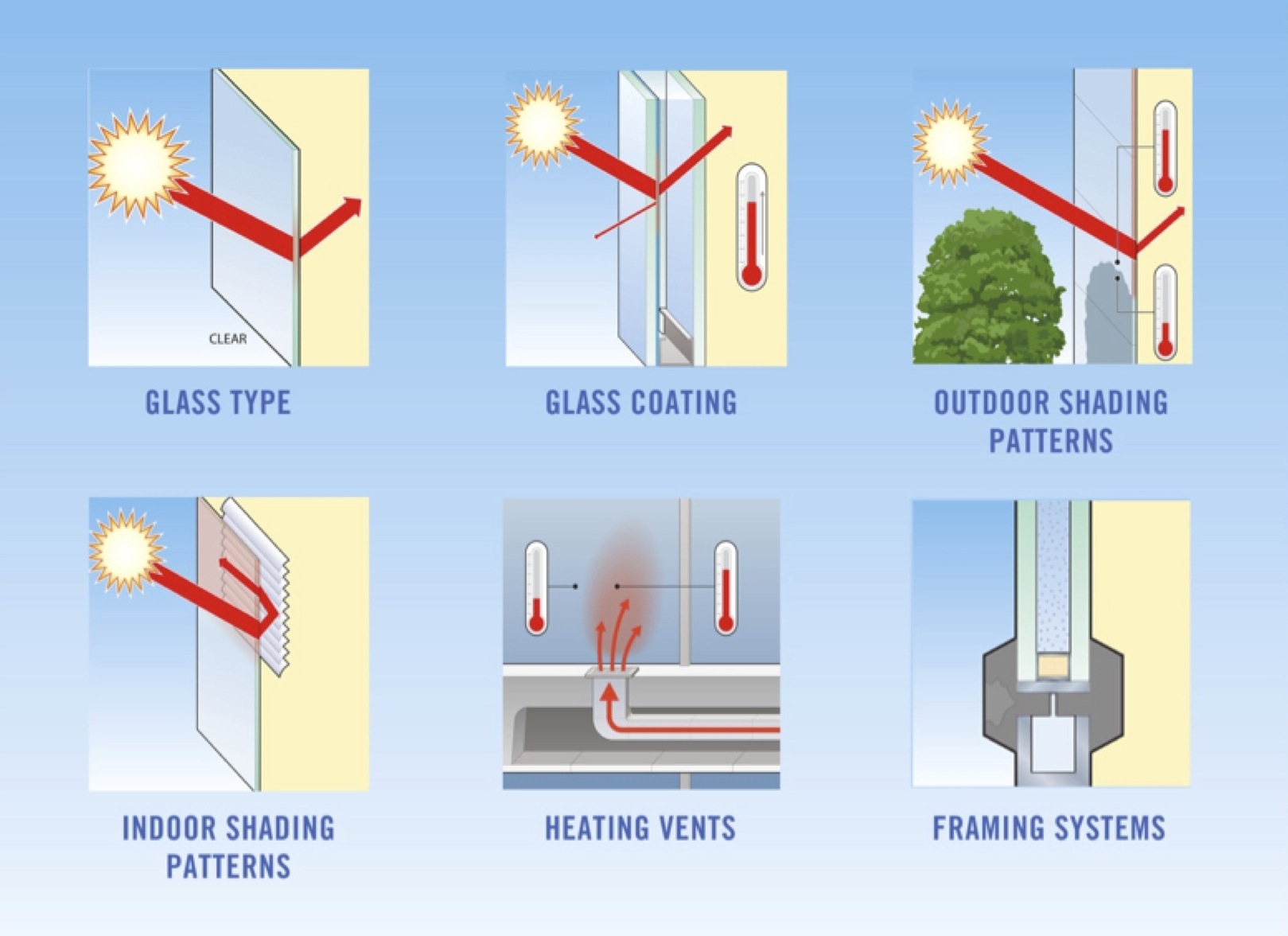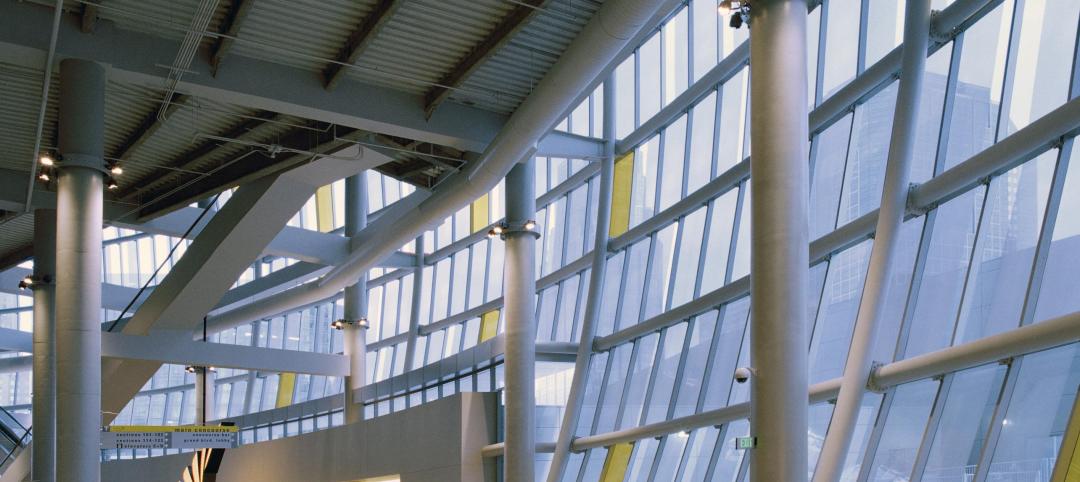Thermal stress is one of many factors that can cause glass to break, even when it is not impacted by a projectile.
Such failures usually are not a testament to the quality of the glass, but rather the result of temperature imbalance within the glass, which can occur when the center of a window or insulating glass unit (IGU) heats and expands while the edges remain cool.
The resulting thermally induced tensile stress on the glass edges can exceed the strength of the glass itself, causing it to break at approximately a 90-degree angle.
Working closely with the IGU fabricator and glass supplier, and conducting a thermal stress analysis at the beginning of the design phase can help architects specify the proper glass for their projects. Here are five thermal stress related rules-of-thumb to consider when specifying glass:
1. Clear or color? Glass can be clear, ultra-clear or tinted in colors such as gray, blue, green and bronze. Tinted glasses absorb solar radiation more than clear glass, which can cause them to collect heat and make them more susceptible to break from thermal stress.
2. Inner or outer surface? Reflective and low-emissivity (low-e) coatings, which improve the solar performance of glass primarily by reflecting solar radiation, can be placed on any one of four surfaces in a dual-pane IGU. While they are usually placed on the inner glass surfaces of the IGU, the coating orientation and the associated risk of thermal stress has to be taken into account.
3. Sunny or shady? Outdoor shading, including overhangs, adjacent buildings, and trees, is one of the most dynamic elements to consider when analyzing thermal stress. Minimizing locations where non-uniform shading of IGUs can occur will help avoid extreme temperature gradients. Interior shading devices, such as blinds or drapes, can increase glass temperature by reflecting solar radiation back through the glass or by reducing the convection and conduction of heat away from the glass. To minimize thermally induced edge stress, the air space around the window glass should be ventilated. There should be a gap of several inches between the glass and shades, blinds or drapes.
4. Where to place a vent? If heating vents, registers and grilles point directly at glass units, warm air will cause the glass to heat up and, under certain conditions, break. Make sure vents are carefully placed to reduce thermal stress risk and avoid placing them between the glass and interior shading devices.
5. How to frame it? Glass framing systems that have low heat capacity also can minimize the chance of a thermal stress break. Structural gaskets and narrow metal framing are favorable because they have less effect on the glass temperature around the edges. Conversely, massive framing – whether metal, masonry or even wood – can have more of an effect, resulting in thermal imbalance and risk of glass breakage.
To learn more about avoiding thermal breakage of insulated glass units and other glass-related topics, visit the PPG Glass Education Center at www.educationcenter.ppg.com.
Related Stories
Museums | Jun 6, 2023
New wing of Natural History Museums of Los Angeles to be a destination and portal
NHM Commons, a new wing and community hub under construction at The Natural History Museums (NHM) of Los Angeles County, was designed to be both a destination and a portal into the building and to the surrounding grounds.
Performing Arts Centers | Jun 6, 2023
Mumbai, India’s new Nita Mukesh Ambani Cultural Centre has three performing arts venues
In Mumbai, India, the recently completed Nita Mukesh Ambani Cultural Centre (NMACC) will showcase music, theater, and fine arts from India and from across the globe. Atlanta’s TVS Design served as the principal architect and interior designer of both the cultural center and the larger, adjacent Jio World Centre.
Architects | Jun 6, 2023
Taking storytelling to a new level in building design, with Gensler's Bob Weis and Andy Cohen
Bob Weis, formerly the head of Disney Imagineering, was recently hired by Gensler as its Global Immersive Experience Design Leader. He joins the firm's co-CEO Andy Cohen to discuss how Gensler will focus on storytelling to connect people to its projects.
Codes and Standards | Jun 6, 2023
California’s new power grid modernization plan furthers ambitious climate goals
California’s new $7.3 billion grid modernization plan is a crucial step in furthering its ambitious climate goals. The board of governors for the California Independent System Operator (CAISO), the state’s grid operator, recently approved a strategy to build thousands of miles of new high-voltage transmission lines.
Mixed-Use | Jun 6, 2023
Public-private partnerships crucial to central business district revitalization
Central Business Districts are under pressure to keep themselves relevant as they face competition from new, vibrant mixed-use neighborhoods emerging across the world’s largest cities.
Multifamily Housing | Jun 6, 2023
Minnesota expected to adopt building code that would cut energy use by 80%
Minnesota Gov. Tim Walz is expected to soon sign a bill that would change the state’s commercial building code so that new structures would use 80% less energy when compared to a 2004 baseline standard. The legislation aims for full implementation of the new code by 2036.
Healthcare Facilities | Jun 5, 2023
Modernizing mental health care in emergency departments: Improving patient outcomes
In today’s mental health crisis, there is a widespread shortage of beds to handle certain populations. Patients may languish in the ED for hours or days before they can be linked to an appropriate inpatient program.
Student Housing | Jun 5, 2023
The power of student engagement: How on-campus student housing can increase enrollment
Studies have confirmed that students are more likely to graduate when they live on campus, particularly when the on-campus experience encourages student learning and engagement, writes Design Collaborative's Nathan Woods, AIA.
Engineers | Jun 5, 2023
How to properly assess structural wind damage
Properly assessing wind damage can identify vulnerabilities in a building's design or construction, which could lead to future damage or loss, writes Matt Wagner, SE, Principal and Managing Director with Walter P Moore.
Cladding and Facade Systems | Jun 5, 2023
27 important questions about façade leakage
Walter P Moore’s Darek Brandt discusses the key questions building owners and property managers should be asking to determine the health of their building's façade.

















